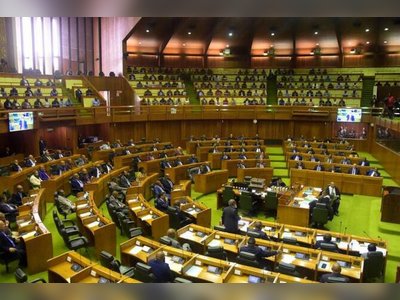
Texas Senate Approves Redistricting Bill, Sending It to Governor for Signature
The Texas Senate approved a redistricting bill on Saturday, which aims to redraw the state's congressional maps and potentially flip five seats held by Democrats to Republicans.
The Texas Senate approved a bill early on Saturday that seeks to redraw the state's congressional maps in an effort to secure a tighter grip on power for Republicans.
This move comes after the state House passed it on Wednesday, as reported by US media outlets.
The measure is now set to be signed into law by Governor Greg Abbott, who is also a Republican, amidst a broader nationwide battle over redistricting.The bill's approval was marked by significant political maneuvering within the Senate.
State Senator Carol Alvarado, a Democrat, had initially planned to delay the passage of the bill through a filibuster, a move where she would continuously speak on the legislative floor to stall proceedings.
In 2021, Alvarado had successfully delayed Texas' district map for over 15 hours.
However, Senate Republicans employed a rare procedural motion just after midnight to end debate and override this filibuster, moving directly towards a vote.
The final approval of the bill was secured through a party-line vote of 18 to 11, following more than eight hours of debate.The redistricting effort by Texas Republicans is strategically aimed at bolstering their standing in the US House of Representatives ahead of next year's midterm elections.
Despite facing potential headwinds, the party believes winning more congressional seats in Texas will be crucial for maintaining their slim majority.
Other states controlled by Republicans are considering similar moves to influence the political landscape.In response, states dominated by Democrats, such as California, have vowed to counter these efforts.
The California legislature recently approved a redistricting plan aimed at gaining five additional congressional seats for Democrats.
This plan still requires voter approval in November.
In contrast, Texas's proposed map does not need voter approval but is expected to face legal challenges from Democrats.The process of passing the bill was initially delayed by more than 50 Democratic state House members who staged a walkout, denying Republicans the legislative quorum necessary for passage.
However, these legislators have since returned, allowing the bill to proceed.Criticism of the new Texas map has centered around allegations that it dilutes Hispanic and Black voting power and discriminates based on race.
Senator Royce West, a Democrat, predicted that the map would reduce the number of African Americans representing Texas in Washington from four to two, deeming this change as 'retrogression.' Proponents of the bill have maintained that race was not a factor in its creation and that it adheres to legal requirements.Public opinion on redistricting also plays a significant role.
A recent Reuters/Ipsos poll found that most Americans view redrawing congressional lines for political gain, known as gerrymandering, as detrimental to democracy.
This move comes after the state House passed it on Wednesday, as reported by US media outlets.
The measure is now set to be signed into law by Governor Greg Abbott, who is also a Republican, amidst a broader nationwide battle over redistricting.The bill's approval was marked by significant political maneuvering within the Senate.
State Senator Carol Alvarado, a Democrat, had initially planned to delay the passage of the bill through a filibuster, a move where she would continuously speak on the legislative floor to stall proceedings.
In 2021, Alvarado had successfully delayed Texas' district map for over 15 hours.
However, Senate Republicans employed a rare procedural motion just after midnight to end debate and override this filibuster, moving directly towards a vote.
The final approval of the bill was secured through a party-line vote of 18 to 11, following more than eight hours of debate.The redistricting effort by Texas Republicans is strategically aimed at bolstering their standing in the US House of Representatives ahead of next year's midterm elections.
Despite facing potential headwinds, the party believes winning more congressional seats in Texas will be crucial for maintaining their slim majority.
Other states controlled by Republicans are considering similar moves to influence the political landscape.In response, states dominated by Democrats, such as California, have vowed to counter these efforts.
The California legislature recently approved a redistricting plan aimed at gaining five additional congressional seats for Democrats.
This plan still requires voter approval in November.
In contrast, Texas's proposed map does not need voter approval but is expected to face legal challenges from Democrats.The process of passing the bill was initially delayed by more than 50 Democratic state House members who staged a walkout, denying Republicans the legislative quorum necessary for passage.
However, these legislators have since returned, allowing the bill to proceed.Criticism of the new Texas map has centered around allegations that it dilutes Hispanic and Black voting power and discriminates based on race.
Senator Royce West, a Democrat, predicted that the map would reduce the number of African Americans representing Texas in Washington from four to two, deeming this change as 'retrogression.' Proponents of the bill have maintained that race was not a factor in its creation and that it adheres to legal requirements.Public opinion on redistricting also plays a significant role.
A recent Reuters/Ipsos poll found that most Americans view redrawing congressional lines for political gain, known as gerrymandering, as detrimental to democracy.











